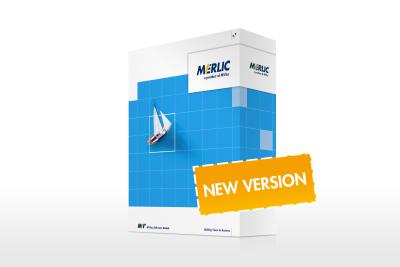
MVTec Software GmbH (www.mvtec.com), a leading international manufacturer of industrial machine vision software, will launch the latest version (5.2) of its easy-to-use machine vision software MERLIC on October 20, 2022. MERLIC enables complete machine vision applications to be quickly developed and deployed without having to write a single line of code.
MERLIC 5.2 is a logical continuation of the approach taken since MERLIC 5, namely to provide customers with the latest deep learning features that are also easy to use. Global Context Anomaly Detection is now being added to the proven deep learning functions Anomaly Detection and Classification (from MERLIC 5) and Deep OCR (from MERLIC 5.1). First deployed in this form as a world first in MVTec HALCON in the spring of 2022, the technology will be made available to MERLIC users just six months later. As in previous versions, users have access to MVTec's Deep Learning Tool for training the data. The tool is designed for easy labeling and training of data. Both operations are in fact crucial steps for any deep learning application. After all, the quality of the labeled or trained data plays a major role when it comes to the performance, accuracy, and robustness of the application. The Deep Learning Tool is easy to use and does not require any programming knowledge.
“With MERLIC we aim to ensure that even demanding machine vision applications can be implemented completely, quickly, and from a single source. Thanks to the integration of Global Context Anomaly Detection and the Deep Learning Tool, an even larger number of users will become interested in using MERLIC, all this without ever having to write a single line of code,” explains Christoph Wagner, Technical Product Manager MERLIC at MVTec.
Global Context Anomaly Detection
As an expansion of the proven anomaly detection, this feature raises deep-learning-based defect detection to a whole new level. MERLIC users can now also benefit from this innovative technology. Global Context Anomaly Detection is a very unique technology because thanks to it, it is possible to “understand” the logical content of images and to detect new variants of anomalies. This feature is of interest to any industrial sector in which, for example, completeness checks, quality inspections, defect detection, or print inspections have to be carried out. Two practical use cases would be the verification of the quality and the position of printing or to inspect electronic components in the semiconductor production.
With Global Context Anomaly Detection, good images are all that is needed for training. This means that no labeling is required. In MERLIC 5.2, it is possible to use the free Deep Learning Tool (DLT) from MVTec for training deep learning applications. The results can then be imported from the DLT into MERLIC and run there without any programming effort.
Easy parameters
The introduction of MVTec EasyParams in MERLIC 5.2 allows users to quickly and easily find and set the relevant camera parameters. Regardless of the camera manufacturer, this simplified configuration tool means that the application can be put into operation more quickly. In addition, MERLIC automatically saves all EasyParams. This increases the number of compatible cameras supported by MERLIC.
Exporting image data from MERLIC
MERLIC 5.2 now also makes it possible to export image data from MERLIC to other interfaces. This is a handy feature for users, because now they can use the images for visualization purposes directly via the communication interface. A communication plug-in, now also included in the scope of delivery, makes it possible to save images separately, such as for quality assurance purposes.
Contact Details
Related Glossary Terms
- quality assurance ( quality control)
quality assurance ( quality control)
Terms denoting a formal program for monitoring product quality. The denotations are the same, but QC typically connotes a more traditional postmachining inspection system, while QA implies a more comprehensive approach, with emphasis on “total quality,” broad quality principles, statistical process control and other statistical methods.







